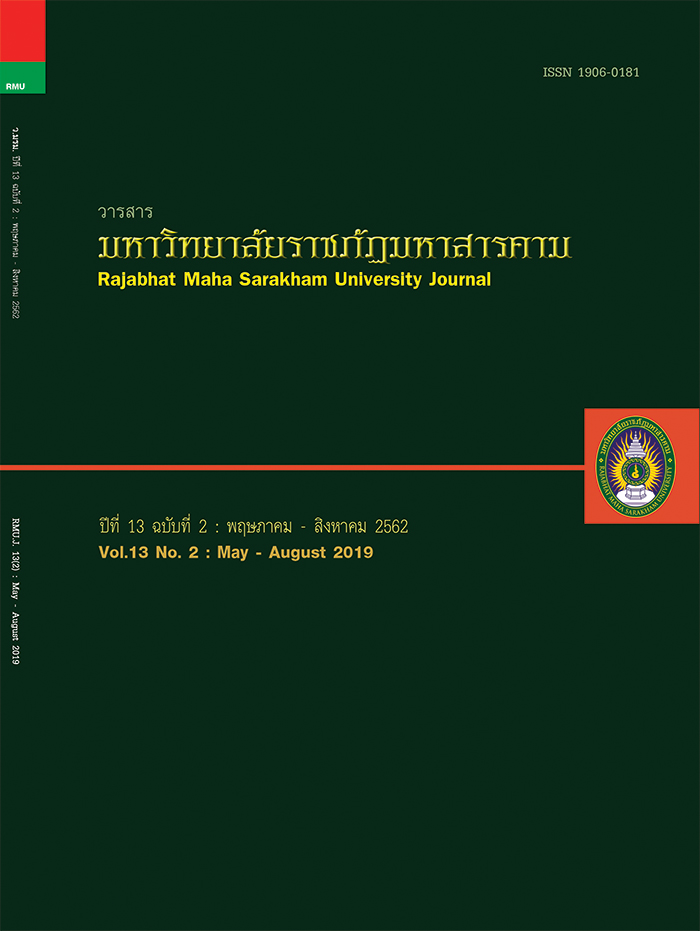การเปรียบเทียบผลสัมฤทธิ์ทางการเรียนวิชาคณิตศาสตร์ ความสามารถในการคิดวิเคราะห์ และเจตคติต่อวิชาคณิตศาสตร์ เรื่องระบบจำนวนเต็ม ของนักเรียนชั้นมัธยมศึกษาปีที่ 1 ระหว่างการจัดการเรียนรู้ตามแนวทฤษฎีพหุปัญญาและการจัดการเรียนรู้แบบกลุ่มร่วมมือ
Main Article Content
บทคัดย่อ
การวิจัยครั้งนี้ มีความมุ่งหมายเพื่อ1) เพื่อพัฒนาแผนการจัดการเรียนรู้ตามแนวทฤษฎีพหุปัญญาและการจัดการเรียนรู้แบบกลุ่มร่วมมือ กลุ่มสาระการเรียนรู้คณิตศาสตร์ เรื่อง ระบบจำนวนเต็ม ชั้นมัธยมศึกษาปีที่ 1 ที่มีประสิทธิภาพตามเกณฑ์ 75/75 2) เพื่อศึกษาดัชนีประสิทธิผลของการจัดการเรียนรู้ตามแนวทฤษฎีพหุปัญญาและการจัดการเรียนรู้แบบกลุ่มร่วมมือ กลุ่มสาระการเรียนรู้คณิตศาสตร์ เรื่องระบบจำนวนเต็ม ชั้นมัธยมศึกษาปีที่ 1 3) เพื่อเปรียบเทียบผลสัมฤทธิ์ทางการเรียนวิชาคณิตศาสตร์ความสามารถในการคิดวิเคราะห์และเจตคติต่อวิชาคณิตศาสตร์ เรื่อง ระบบจำนวนเต็ม ของนักเรียนชั้นมัธยมศึกษาปีที่ 1 ระหว่างการจัดการเรียนรู้ตามแนวทฤษฎีพหุปัญญาและการจัดการเรียนรู้แบบกลุ่มร่วมมือกลุ่มตัวอย่างที่ใช้ในการวิจัยครั้งนี้ ได้แก่ นักเรียนชั้นมัธยมศึกษาปีที่ 1 โรงเรียนท่าตูมประชาเสริมวิทย์ สังกัดสำนักงานเขตพื้นที่การศึกษามัธยมศึกษา เขต 33 ภาคเรียนที่ 1ปีการศึกษา 2561 จำนวน 2 ห้องเรียน จำนวน 83 คน ได้มาโดยวิธีสุ่มแบบกลุ่ม (Cluster Random Sampling) สถิติที่ใช้ในการวิเคราะห์ข้อมูล ได้แก่ ร้อยละค่าเฉลี่ย ส่วนเบี่ยงเบนมาตรฐาน และการวิเคราะห์ความแปรปรวนพหุคูณตัวแปรแบบทางเดียว(One – way MANOVA)ผลการวิจัย พบว่า 1) ผลการพัฒนาแผนการจัดการเรียนรู้ตามแนวทฤษฎีพหุปัญญาและการจัดการเรียนรู้แบบกลุ่มร่วมมือ กลุ่มสาระการเรียนรู้คณิตศาสตร์ เรื่อง ระบบจำนวนเต็มชั้นมัธยมศึกษาปีที่ 1 ที่สร้างขึ้นมีประสิทธิภาพ 78.62/76.35 และ 80.95/79.84 ตามลำดับ มีประสิทธิภาพตามเกณฑ์ 75/75ที่ตั้งไว้2)ดัชนีประสิทธิผลของการจัดการเรียนรู้ตามแนวทฤษฎีพหุปัญญาและการจัดการเรียนรู้แบบกลุ่มร่วมมือเรื่องระบบจำนวนเต็ม ชั้นมัธยมศึกษาปีที่ 1 มีค่าเท่ากับ 0.6443 และ 0.6808 ตามลำดับ แสดงว่าผู้เรียนที่ได้รับการจัดการเรียนรู้ตามแนวทฤษฎีพหุปัญญาและการจัดการเรียนรู้แบบกลุ่มร่วมมือมีความก้าวหน้าในการเรียนรู้เพิ่มขึ้นคิดเป็นร้อยละ 64.43 และร้อยละ 68.08 ตามลำดับ 3)นักเรียนที่เรียนด้วยวิธีการจัดการเรียนรู้ตามแนวทฤษฎีพหุปัญญาและการจัดการเรียนรู้แบบกลุ่มร่วมมือ มีเจตคติต่อวิชาคณิตศาสตร์ไม่แตกต่างกัน แต่นักเรียนที่เรียนด้วยจัดการเรียนรู้แบบกลุ่มร่วมมือมีผลสัมฤทธิ์ทางการเรียนวิชาคณิตศาสตร์ความสามารถในการคิดวิเคราะห์ สูงกว่านักเรียนที่เรียนด้วยการจัดการเรียนรู้ตามแนวทฤษฎีพหุปัญญาอย่างมีนัยสำคัญทางสถิติที่ระดับ .05
Article Details
1. บทความที่ลงตีพิมพ์ทุกเรื่องได้รับการตรวจทางวิชาการโดยผู้ประเมินอิสระ ผู้ทรงคุณวุฒิ (Peer Review) สาขาที่เกี่ยวข้อง อย่างน้อย 3 ท่าน ในรูปแบบ Double blind review
2. ข้อคิดเห็นใด ๆ ของบทความที่ลงตีพิมพ์ในวารสารมหาวิทยาลัยราชภัฏมหาสารคาม นี้เป็นของผู้เขียน คณะผู้จัดทำวารสารไม่จำเป็นต้องเห็นด้วย
3. กองบรรณาธิการวารสารมหาวิทยาลัยราชภัฏมหาสารคาม ไม่สงวนสิทธิ์การคัดลอกแต่ให้อ้างอิงแสดงที่มา
เอกสารอ้างอิง
Ministry of Education. (2008).Indicators and core learning content Group learning mathematics According to the core curriculum of basic education 2008.Bangkok : Printing Agriculture Cooperatives of Thailand.
Kalyakorn Kaewroj. (2013). Comparisons of Learning Achievement on Linear Equation with one variable for Mathayomsuksa 1 Students, MathematicalReasoning and Analytical Thinking Abilities Between Using Cooperative Learning TAI Technique and Applied MultipleIntelligence Theory.Master’s thesis. Mahasarakham:Mahasarakham University.
Chonnicha Sanggaew. (2014). A Comparison of Learning Achievement, Analytical Thinking and Achievement Motivation of Mathayomsuksa 2 students BetweenUsing Learning Based on the Constructionism Theory and Multiple Intelligence Theory.Master’s thesis. Mahasarakham:Mahasarakham University.
Doungduen on-noum. (1999).Developing and enhancing mathematics teaching competencies of elementary school teachers. Bangkok :Faculty of Education,Chulalongkorn University.
Tisana Khammani. (2014).Teaching Science : Knowledge for Organizing Effective Learning Processes. 15th Edition. Bangkok : Chulalongkorn University.
Teerapat Sarngkam.(2013). Comparisons of Learning Achievement, Analytic Thinking,and Mathematical Reasoning of Prathomsuksa 6Students Between Who Learned Using Cooperative Learning with TAI Approach andBased on The Multiple Intelligences TheoryApproach. Master’s thesis. Mahasarakham:Mahasarakham University.
Nalini Na Nakorn. (2009). Principles of measurement and evaluation of thinkingVolume 1.Nonthaburi : Project for the development of children and youth in remote areas under the initiative of Her Royal HighnessPrincess Maha Chakri Sirindhorn.
Nittaya Semlao.(2014). Comparisons of LearningAchievement in Summation Subtraction AndMultiplication of Decimal, Problem Solving And Attitude toward Mathematics of pratomsuksa5 Students between TAI and TGT Group LearningMethods.Master’s thesis. Mahasarakham:Mahasarakham University.
Pakin Anantakitbamrung. (2014). A Comparison of Learning Achievement, Mathematical Reasoning Ability and Attitude Towards Mathematical Learning ofMathayomsuksa 1 Students Between Using Learning Organization of the Cooperative Learning with STAD Approach and Learningwith TGT Approach, Entitled The One -Variable Linear EquationMaster’s thesis. Mahasarakham:Mahasarakham University.
Pattrawadee Srisarakham. (2014). Development of Learning Management in Mathematics to Enhance Academic Achievement and AnalyticThinking, Based on ApproachCombined with Conceptions of Constructivist Theory and Cooperative Learning, for Prathomsuksa 4 Students. Master’s thesis. Mahasarakham:Mahasarakham University.
Yupin Phiphitkul.(2002). Mathematics teaching. Bangkok : Faculty of Education,Chulalongkorn University.
Rachanee Nomrawee.(2011). Comparisons ofLearning Achievement Entitled “A LinearEquation in One Variable,” Analytical Thinking and Attitudes toward Mathematics of Mathayomsuksa 1 Students Who Learned Using the TGT Learning Model and the 4 MAT LearningModel.Master’s thesis. Mahasarakham:Mahasarakham University.
Nomsri Kate. (2008). Learning management using various forms. 2nd Edition. Nonthaburi : Academic Support Center.
Wimonrat Soonthornroj. (2006). Innovation forLearning. Mahasarakham : Department of Curriculum and Instruction, Faculty of Education, Mahasarakham University.
National Institute of Educational Testingservice PublicOrganizetion. (2016) O-net test reportM.3 academic year 2016. (http://www.niets.or.th) 31 march2016.
National Institute of Educational Testingservice PublicOrganizetion. (2017) O-net test report M.3 academic year 2017. (http://www.niets.or.th)31 march2017.
ArreeSanhachawee. (2000). Multiple Intelligence and Cooperative Learning. Bangkok : Wean Keaw.
Peera rattanavichit. (2001). Application of multiple intelligence theories to learning reform. Bangkok : Thammasarn.
Chowwalit Chookhampaeng. (2008). Curriculum development.Mahasarakham : Mahasarakham University.


